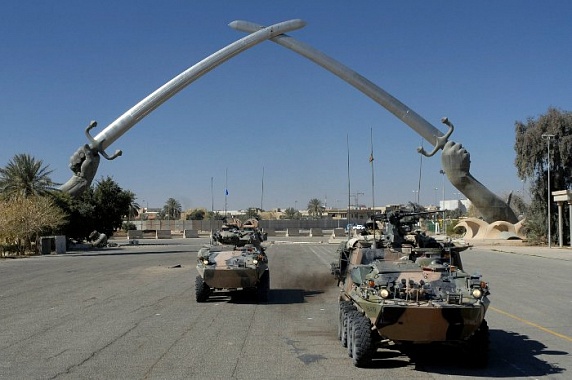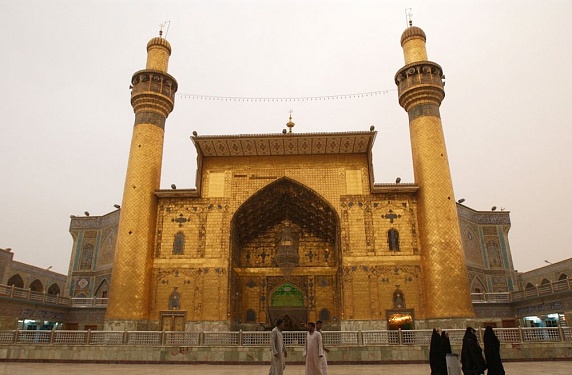 La República de Irak
La República de Irak
ARTICLE OF RUSSIAN MINISTER OF FOREIGN AFFAIRS IGOR IVANOV, PUBLISHED IN THE NEWSPAPER VREMYA NOVOSTEI ON NOVEMBER 24, 2003, UNDER THE HEADING "IN THE FACE OF COMMON CHALLENGES"
Unofficial translation from Russian
How to Translate the Unity of Strategic Interests of the World Community into the Language of Concerted Actions
The criminal terrorist acts in Istanbul, which took scores of lives, have again reminded the world of the threat of terrorism and other dangerous challenges, with which the international community is currently faced.
Today it is hardly probable that somebody doubts that the present-day threats to the security of an individual and of our entire civilization have assumed a global character. This means that the fight against them requires a uniting of the efforts of all states.
Nevertheless, we are still far from a system of international security which would make it possible to effectively react to the existing threats and prevent the emergency of new ones in time. The unprecedented number of unsettled regional conflicts and hotbeds of tension, including in the Middle East, Iraq and Afghanistan, are a testimony to this.
The paradox of our time is that the world community is ever more acutely aware of the community of its strategic interests, but continues to lack sufficient instruments to translate it into the language of concerted actions.
What hinders this, then? Why, being faced as we are with common challenges and even sharing common values, we quite often act separately?
The tragic events of September 11, 2001, in the US were an eye-opener for the entire world as to the true scale of a global terrorist threat, of which Russia had long since been warning. For the first time since World War II, the international community again rallied against a common enemy. A global antiterrorist coalition began to take shape, in which cooperation between Russia and the United States took a leading position.
The first serious test was the operation against terrorism in Afghanistan. One cannot but agree with the assessment made a few days ago by US Secretary of State Colin Powell: "Afghanistan became a fine model that the international community can act together" (editorial reference: see Vremya Novostei of November 20).
Let us think, however, why this occurred. For it is obvious that such unity could not arise in a vacuum. It was conditioned by the fact that the threat emanating from the territory of Afghanistan was real and generally acknowledged. Therefore the use of force was unanimously supported by the world community and received a legitimate sanction of the United Nations. In addition, immediately after the end of active combat actions the process of a postwar state and political reconstruction of Afghanistan was launched under UN auspices, thanks to which not only was respect of the sovereignty of the country ensured, but conditions were also established for the Afghan people to regard the foreign presence as assistance and support, not as occupation.
It would seem that the experience of Afghan settlement had created a precedent opening up the possibility through cooperation in the fight against terrorism to arrive at the formation of a long-term strategy of the world community in combating global threats and challenges. However this experience, regretfully, turned out to be an exception rather than the rule. The Iraq crisis that then followed brought a serious split in the world community because it had called in question the fundamental principles on which the global antiterrorist coalition was established.
The attitude of Russia towards the military action taken by the US and its allies against Iraq on March 20, 2003, is well known. We believed then, and so do now, that there existed a real possibility of a political settlement of the Iraq problem on the basis of the relevant UN Security Council resolutions. However, what has happened has happened. And today it is necessary together to seek a way out of the regional crisis, which affects the interests of global stability.
In the course of the Iraqi crisis the member states of the UN Security Council demonstrated an ability to rise above tactical disagreements, however sharp they might be, in the name of common strategic interests. Immediately after the end of active combat in Iraq in May 2003. the United Nations Security Council unanimously passed Resolution 1483 that made it possible to a certain extent to relax the tension around the Iraq problem and to return its discussion to the international legal field of the UN. This line received its further development in Resolution 1511, which opens up possibilities for the restoration of Iraq's sovereignty and a weightier UN role in political settlement.
Nevertheless the situation in Iraq continues to deteriorate rapidly. Both internal and external extremists of various kinds are seeking to take advantage of the political trouble.
The settlement formulas hitherto suggested by the interim authorities of Iraq are not working. The question arises, "Why?" It appears that their chief drawback is that they are being prepared without regard for the opinion of the broad sections of the Iraqi people and the international community and without a proper reliance on the UN. Yet it has been thanks precisely to these principles that the prospect of settlement has been successfully opened in Afghanistan. The sooner we will use them in Iraq, the more chances there will be to get out of the present crisis.
Russia is convinced that, despite the complexities of the present stage of international life, the possibilities for concerted actions by the world community do exist. However in this case it is crucial that all the countries, regardless of their political, military and economic strength, should become aware that the realization of their individual interests ultimately is impossible without the implementation of the collective interests of the international community.
It is needless to say that this applies above all to the states bearing special responsibility for the maintenance of international peace and security. As President Vladimir Putin declared, speaking at the 58th session of the UN General Assembly, "to be a world power means to be together with the world community; to be a truly strong, influential state is to see and tackle the problems of both small peoples and economically weak countries."
This necessitates a multilateral approach towards solving international problems, which the overwhelming majority of the world's states today supports.
Multilaterality means, first and foremost, the recognition of the impossibility single-handedly to deal even with regional problems of a comparatively limited scale, not to speak of the tasks of global security. Multilaterality presupposes mutual consideration of the opinions and interests of the partners. It fully corresponds to the nature of the contemporary world, which is becoming ever more united and interdependent, but at the same time remaining infinitely diverse in the civilizational, cultural, religious and many other respects.
A second major condition of the unity of the world community is strict observance of the principles and rules of international law. In the contemporary world the moral authority and political leadership of a state must be determined by the extent of its commitment to international legality. Without this we are doomed to mark time before a closed door to resolving numerous problems and conflicts.
International law, of course, is not a rigid dogma. It can and should develop with regard for the changing conditions. But there should arise no legal vacuum in the process. The existing rules of law should be undeviatingly observed. Only in this case is it possible to reach a state of things in which each state would fulfill the respective obligations to the world community, and the latter, in its turn, would protect the lawful interests of each of its members.
Finally, the third major condition of the world community's unity is the ensuring of the central UN role in international relations. Undoubtedly, the UN should also be improved. This presupposes the need for Security Council reform too. Russia advocates that it should be pursued without artificial haste on the basis of the widest possible agreement. The Security Council should be more representative, but most importantly - more efficient. Only thus is it possible to strengthen its authority in world affairs.
Thus, multilaterality, respect of international law and the central UN role are the main principles on which the coordination of actions by the world community can be achieved. In them there is nothing that would infringe the dignity and interests of Russia, the United States or any other state. On the contrary, it is on the basis of these principles that the world community can begin, at last, to move forward towards a new, more secure and equitable world order.







